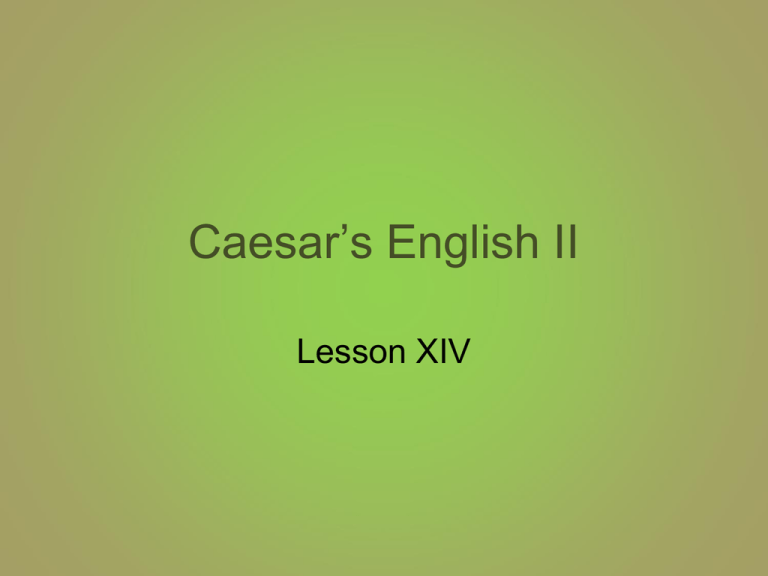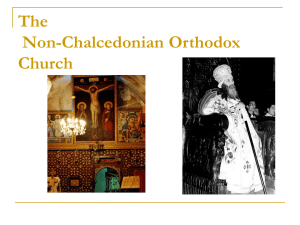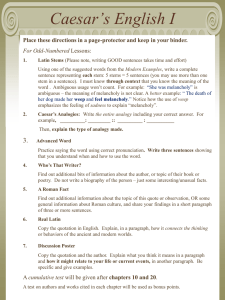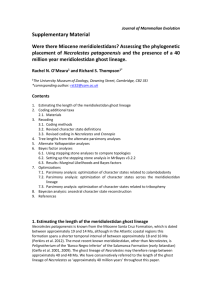Caesar`s English II
advertisement

Caesar’s English II Lesson XIV Caesar’s English XIV 1. 2. 3. 4. 5. verdure: vegetation equivocal: ambiguous orthodox: traditional profane: irreverent tumult: disturbance verdure n.(VUR-dyoor):vegetation The English noun verdure, from the latin viridis, refers to vegetation, to greenery. The adjective form is verdant. In All the King’s Men Robert Penn Warren wrote that “you hear the July flies grinding away in the verdure.” Spanish: verdor equivocal adj.(ee-KWIV-o-cul):ambiguous To be equivocal (from the Latin aequivocus) is to be ambiguous, to say or suggest two things at the same time, perhaps intentionally so as to avoid taking a stand. It is to give equal (equi) voice (voc) to both sides. The verb form is equivocate, and the noun is equivocation. We also often see the negative form, unequivocal, which is what you are when you do take a stand. Perhaps the most famous equivocal sentence of all comes from Shakespeare’s Macbeth: “Faith, here’s an equivocator that could swear in both the scales against either scale.” What do you think that line means? Spanish: equívoco orthodox adj. (ORTH-o-dox): traditional The English adjective orthodox comes from the Latin orthodoxus, which the Romans got from the Greek orthodoxos. To be orthodox is to be traditional or conventional in your views, to believe what society expects you to, to have your opinion (dox) straight (ortho), in the eyes of others. John Kennedy, in Profiles of Courage, wrote that “any unpopular or unorthodox course arouses a storm of protests.” Spanish: ortodoxo profane adj. (pro-FAIN): irreverent The English adjective profane, from the Latin profanus, means irreverent, un-holy. It can even mean defiled. Frederick Douglass, in his famous Narrative, says that Mr. Plummer was “a profane swearer, and a savage monster.” Spanish: profano tumult n. (TUM-ult): disturbance Spanish: tumulto The English noun tumult, from the Latin tumultus, means a disturbance and even traces back to the Latin verb tumere, to swell. A tumult is a disturbance that suddenly swells up, sudden uproar and clamor. In Kenneth Grahame’s The Wind in the Willows, the animals can “hear the tumultuous applause.” In what way is a tumult like a swelling? Caesar’s English XIV 1. 2. 3. 4. 5. verdure: vegetation equivocal: ambiguous orthodox: traditional profane: irreverent tumult: disturbance Caesar’s Classic Words Challenge 1. From Aldus Huxley’s Brave New World. No offense is so heinous as _________ of behavior. a. verdure b. equivocation c. unorthodoxy d. tumult Caesar’s Classic Words Challenge 1. From Aldus Huxley’s Brave New World. No offense is so heinous as _________ of behavior. a. verdure b. equivocation c. unorthodoxy d. tumult 2. From Arthur Conan Doyle’s The Hound of the Baskervilles He was a most wild, __________, and godless man. a. b. c. d. profane orthodox tumultuous equivocal 2. From Arthur Conan Doyle’s The Hound of the Baskervilles He was a most wild, __________, and godless man. a. b. c. d. profane orthodox tumultuous equivocal 3. From Jane Austen’s Pride and Prejudice His answers were at the same time so vague and ____________. a. b. c. d. profane orthodox equivocal tumultuous 3. From Jane Austen’s Pride and Prejudice His answers were at the same time so vague and ____________. a. b. c. d. profane orthodox equivocal tumultuous The Grammar of Vocabulary: equivocal, an adjective. Caesar was equivocal, and they hesitated circumspectly.










